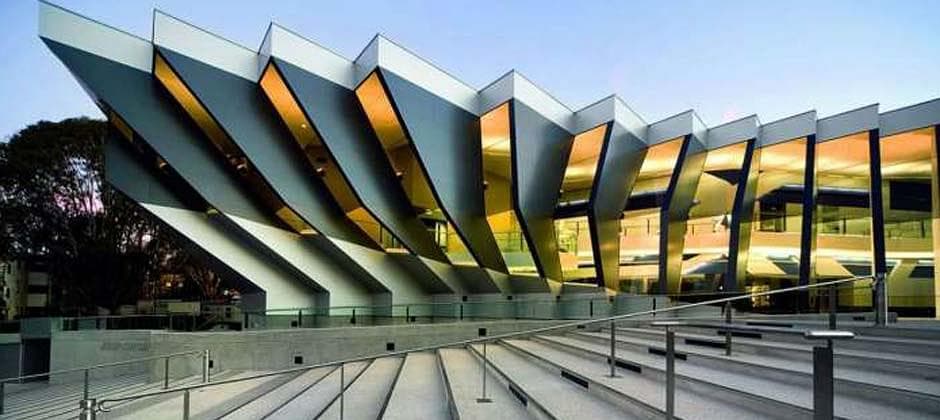

Australian National University
Canberra, Australia
- Cost of LivingAU$ 19,860
- Tuition Fee FromAU$ 23,088
- Country Rank#6
- Batch Strength18,934
- Global Diversity47%
- Gender Ratio52 : 48
Overview
About
Australian National University is a government-funded university in Canberra, Australia. The institution, which was founded in 1946, was initially limited to graduate studies. Undergraduates were accepted for the first time in 1960 when Canberra University College (1929) became part of the university. The Institute of Advanced Studies and the unit liable for doctoral degrees are linked with the university, as are research schools of Medicine, Physical and Biological Sciences, Social Sciences, and Pacific Studies. In 2006, ANU was restructured into seven distinct colleges: arts and social sciences, business and economics, engineering and computer science, law, medical, biology and environment, and physical and mathematical sciences.
ANU's main campus sprawls across the Acton district, encompassing 358 acres of mostly parkland with university buildings set inside. ANU is renowned as a sustainable campus, with over 10,000 trees on its grounds. ANU has a thriving campus community and a large selection of catered and self-catered student housing within easy walking or riding distance of the city. There are four more campuses: Kioloa Coastal Campus in New South Wales, Mount Stromlo Observatory in the Australian Capital Territory (ACT), North Australia Research Unit campus, and Siding Spring Observatory in New South Wales.
ANU has around 10,000 undergraduate and 11,000 postgraduate students from all across Australia and the world. Its main campus, which is located on Australian Indigenous Ngunnawal and Ngambri territory, serves as a worldwide for the University's exceptional learning community. Students interact closely with world-class academics to explore their interests and potential via research, mentorship, and hands-on learning in real-world situations and cutting-edge facilities.
ANU, a member of the Group of Eight, is regarded as one of Australia's finest educational institutions and the only Australian member of the International Alliance of Research Universities. ANU students interact with brilliant minds and learn from world-class scholars, with six Nobel laureates and two Australian prime ministers among its faculty and alumni. The university is made up of four learned societies: the Academy of Humanities, the Academy of Science, the Academy of Social Science, and the Academy of Law. Its library, which houses millions of books and research papers, is divided into six branches and is open 24/7 to students and faculty.
Ranking
QS World University Ranking 2024:
Australian National University has shown excellence by securing 67 spot on the global scale.ANU is a well-known open research university that was founded more than 50 years ago. The university was ranked among the top 100 institutions in the world by major ranking publications. Since 2017, QS (Top Universities) has rated it among the top 50 universities in the world. ANU has a strong academic reputation, a low faculty-to-student ratio, and a high number of citations per faculty member. Here are some of the top Australian National University ranking highlights -
- Graduate Employability Rankings - #66
- THE World University Rankings 2022 - #54
- #1 in Australia for offering excellent research opportunities
- Best Global Universities in Australia/New Zealand - #6
Course Rankings
THE ranked ANU in 10 of its programmes, with 4 subjects ranked amongst the top 50 and 5 of them in the top 100. Along with hands-on learning opportunities, global exchange & employment opportunities, as well as industry & government internships ANU’s degrees help students land the most desired jobs. Here’s a list of the university’s course-wise rankings according to THE World University Rankings, 2022-
Arts & Humanities - #29
Research - 76.7
Teaching - 58.8
Clinical, Pre-Clinical, & Health - #81
Research - 41.7
Teaching - 32.9
Engineering & Technology - #93
Research - 41.2
Teaching - 36.2
Life Sciences - #65
Research - 52.2
Teaching - 33.6
Physical Sciences - #43
Research - 66.2
Training - 49.2
Social Sciences - #38
Research - 71.6
Teaching - 63.0
Business & Economics - #80
Research - 52.5
Teaching - 45.9
Year
QS Ranks
US News Ranks
2023
#30
#62
2022
#27
#62
Facilities
The main campus of ANU is located inner-city suburb of Acton, Canberra. However, there are other campuses in the ACT, NSW, and the NT, all of which provide an array of extraordinary Australian National University facilities that assist both professors and students with teaching, learning and research. Here’s a list of some of the most commonly used facilities and services at ANU -
Acton Campus: Situated in the heart of the Australian capital city - Canberra, Acton Campus is within a short distance from the country’s cultural institutions including the Australian Parliament House. At this campus, students can make use of multiple facilities including -
- Modern Lecture Halls
- Libraries
- Laboratories
- Cafes& Bars
- Supermarkets
- Child Care Centres
- Medical Centre
Kioloa Coastal Campus: Also known as ANU’s coastal field station, Kioloa Coastal Campus was founded in 1975. This campus comprises ANU’s outdoor classroom in New South Wales to engage, teach, and learn with national parks and outstanding beaches. It includes facilities such as -
- A field lab & P2C lab
- Ecosystems & Habitats
- Student Field Trips
- Meeting rooms
- Lecture theatres
Mount Stromlo Observatory: MSO houses the ANU Research School of Astronomy & Astrophysics. The observatory comprises the administrative centre, offices for astronomers and students, digital & optical workshops, as well as huge computer laboratories.
North Australia Research Unit Campus: NARU is ANU’s research facility providing resources and catering to researchers working in North Australia & its surrounding areas. There are multiple NARU Seminar Series wherein presentations are delivered covering a wide range of topics from Australian as well as worldwide researchers.
Notable Alumni



Courses
Admission
Australian National University Entry Requirements
Australian National University’s acceptance rate is 35%, which makes it quite competitive to get admission. International students must review the university’s programme pages on the website portal to determine the exact prerequisites expected. Regardless of the course-specific requirements, it is critical for all students to fulfil the English language criteria for university entrance. Moreover, applicants to ANU, whether domestic or international, must present evidence that their English language competence fulfils the admission standards and gains the minimum test scores. Unless otherwise stated, the most current evidence will be utilised to demonstrate English language competency. Here’s a list of the Australian National University entry requirements for both undergraduate as well as graduate programmes -
Undergraduate Programmes
- Candidates must have successfully completed two years of full-time (or equivalent) secondary (year 12 equivalent) or higher study in English within the past four years.
- The study undertaken must result in a sequence of study or certification that is acceptable for admittance into ANU undergraduate programmes.
- Candidates must pass with at least 50% of attempted units/courses in any assessable period (for example, term or semester) in their academic year.
Graduate Programmes
- Applicants are required to successfully complete two years of full-time (or equivalent) tertiary education within the last 4 years, English is the medium of instruction.
- Applicants should pass with a minimum of 50% of their attempted courses/units within any assessable period in their academic year.
Australian National University Fees
Students enrolled in study abroad programmes at ANU may find their course fees on the university’s Programmes & Courses page. An invoice is issued to students at the beginning of every semester or session and students are required to pay their fees within the allotted deadlines. The Australian National University fees broadly vary based on the course type, course intricacies, course structure and other factors. On average, international students can expect to pay anything between 29,628 AUD to 45,360 AUD per annum at ANU. Here’s a list of the tuition fees based on the programme level chosen -
- MS Courses - AUD 39.79 K - 49.74 K
- MIM Courses - AUD 39.79 K - 47.75 K
- B.E./BTech - AUD 45.27 K - 47.94 K
- MBA/PGDM - AUD 45.36 K
- BBA Courses - AUD 39.79 K - 48.61 K
- B.Sc - AUD 47.94 K - 48.61 K
- M.E./MTech - AUD 47.75 K
- M.A. - AUD 44.47 K
Australian National University Placement
ANU arranges job fairs for students to meet potential employers from several fields. International in Focus is a job expo for overseas students seeking employment in Australia. The fair is attended by BOE, Infosys, Google India, Microsoft South Asia, and other renowned firms. ANU CareerHub is the university's employability tool that assists students in securing Australian National University placements. It not only lists job openings in Australia, but also career resources, services, and appointments. MBA graduates earn an average income of around 90,000-1,000,000 AUD, according to the pay scale data. Graduates of ANU's most popular courses earn an average salary of -
- MBA - AUD 128,000
- Bachelors of Science - AUD 115,000
- Masters - AUD 110,000
- Masters in Finance - AUD 105,000
- Masters in Arts - AUD 103,000
- Bachelor of Arts - AUD 90,000
Scholarship
Regardless of the programme you are studying, there are several scholarship opportunities provided by Australian National University as well as other organisations. With so many scholarships available now, overseas students can greatly lower the financial burden of studying in a new country. You can apply for scholarships to study at ANU through UniScholars. You can find the following types of scholarships based on your academic performance and financial situation:
- Merit-based scholarships
- Need-based scholarships
- Country-specific scholarships
- College-specific scholarships
- Student-specific scholarships
Finances
Most international students are obligated to show proof of sufficient funds in order to obtain a visa. While some students may have the opportunity to make use of scholarships, not all students cut the eligibility to get a scholarship or a grant. Moreover, not all scholarships cover 100% of your study abroad expenses. At such times, most students resort to acquiring education loans to avoid the financial hassles associated with studying at the university. For Indian students, UniCreds is the ideal education loan marketplace if you’re looking for low-interest rates and free consultation services!
Cost Of Studying At Australian National University
Interest rates as low as 8.9% *
Avg. on-campus living expense AU$19,860
250K+
Students Assisted
800Cr+
Loan Amount Disbursed
5000+
Loans Sanctioned
Accommodation
There are several student housing options available for students planning to attend Australian National University. You may select from a wide choice of affordable yet elegant student flats, halls of residence, studios, ensuites, and more! You have the option of staying on campus in the university halls of residence or in a private residence. Because of their proximity to the university, on-campus housing options may be ideal; nevertheless, they tend to fill up fast and are more expensive.
UniAcco simplifies the process of finding student housing and offers a variety of options. As a result, students can select from a wide range of available student accommodation near the university, such as luxury studios, en-suites, and shared apartments that are more inexpensive and student-friendly.
Cost of Living
Compared to Melbourne and Sydney, Canberra is a more cheap travel destination with a higher standard of living for students. Canberra is rated as the most pleasant city in the nation by the Daily Mail, a middle-market British daily newspaper. It has been named Australia's finest place to live for the third year in a row. Canberra ranks at the top when compared to other cities in terms of inexpensive housing, strong work possibilities, careers, health care, and safety. Here's the cost of living in Canberra as an international student -
|
Particulars |
Cost (per month) |
|
Off-Campus Accommodation |
AU$ 708 |
|
On-Campus Accommodation |
AU$ 972 |
|
Transportation |
AU$ 132 |
|
Food Cost |
AU$ 660 |
|
Utility Cost |
AU$ 179 |
|
Entertainment |
AU$ 49 |
|
Groceries |
AU$ 179 |
|
Clothes |
AU$ 81 |
|
Total Cost of Living with Off Campus Accommodation |
AU$ 1856 |
|
Total Cost of Living with On Campus Accommodation |
AU$ 2120 |